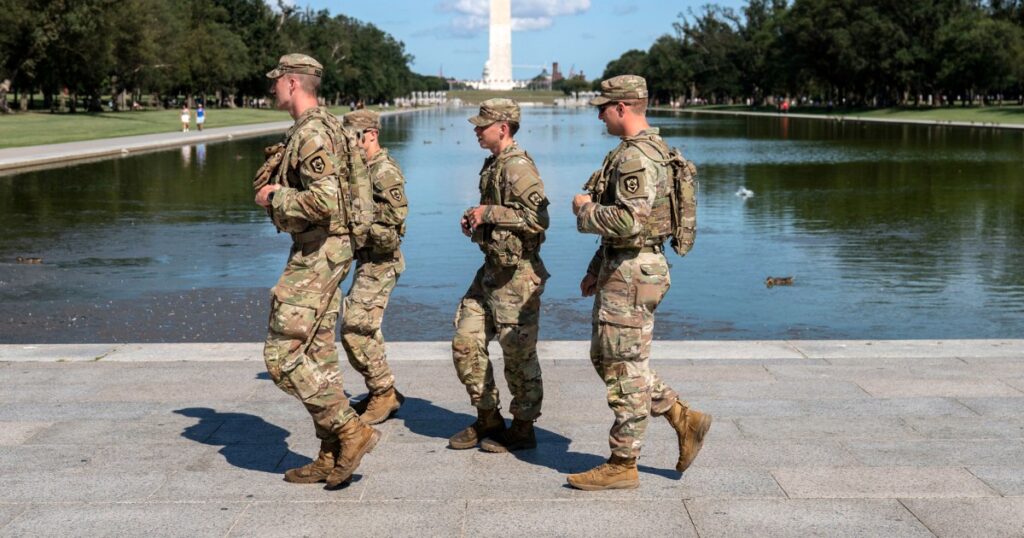TLDR;
President Donald Trump deployed National Guard troops and federal agents to Washington, D.C., claiming efforts to reduce crime, but the move has instilled fear among immigrant communities, particularly in neighborhoods like Columbia Heights. Many immigrants, including those with legal status, report feeling racially targeted and are avoiding essential activities like work and grocery shopping due to the increased enforcement presence. An undocumented immigrant, Margarita, shared that her restaurant business has been severely impacted, with employees too afraid to work after witnessing arrests and mistreatment. The White House denies claims of racial profiling, stating that enforcement targets illegal activity, not race, and has highlighted arrests of individuals linked to crimes like assault and gang activity. However, residents and business owners describe a climate of terror, with checkpoints and frequent arrests, leading to deserted streets and struggling businesses. Many now feel unsafe, with some citizens even fearing detention based on their appearance.
Federal Takeover in Washington, D.C., Sparks Fear Among Immigrant Communities
In early August, President Donald Trump deployed National Guard troops to Washington, D.C., promising to combat crime and restore safety to the streets. However, in neighborhoods like Columbia Heights, this military presence has instilled widespread terror among immigrant communities. Many immigrants feel racially targeted and describe the city as resembling a dystopian version of the place they once loved.
Immigrants and immigration advocates shared with NBC News that the federal takeover has transformed bustling neighborhoods and businesses into deserted areas. Both naturalized citizens and undocumented individuals expressed a growing sense of fear, avoiding basic activities like grocery shopping, work, and daily routines.
Margarita, a 38-year-old undocumented immigrant from El Salvador and owner of a Latino restaurant, revealed that half of her employees are too afraid to work. One employee, visibly distraught, described witnessing an arrest and the mistreatment of individuals. Another worker likened federal officers to “cats stalking mice.” Margarita expressed her inability to encourage her employees to work, fearing the consequences of potential arrests. Her business has been severely impacted, and she lamented the city’s transformation, calling it “horrible” to see the trauma inflicted on its people.
Many individuals, including Margarita, requested anonymity to avoid deportation or retaliation for speaking out. Since Trump announced the federal takeover on August 11, aiming to reduce crime and increase immigration arrests, over 2,200 National Guard troops and hundreds of federal agents have been deployed to the city. Notably, violent crime in D.C. had already declined by 26% compared to the previous year, according to police data. The Justice Department is now investigating whether Washington police manipulated crime data.
A White House official reported over 1,000 arrests since the National Guard arrived, though specifics on immigration-related arrests were not provided. Press Secretary Karoline Leavitt emphasized the administration’s focus on removing “violent criminals” and “public safety threats.” The administration has highlighted arrests of alleged gang members and individuals with violent crime histories, including assault and child abuse allegations.
Residents have reported witnessing arrests by immigration agents and encountering checkpoints where officers stop vehicles to demand licenses. These actions have heightened fears of racial profiling, particularly among Latino communities.
Granados, a naturalized citizen from El Salvador, described seeing federal agents detain two men in Columbia Heights, a neighborhood with a large immigrant population. He expressed his distress, stating that he and many Latinos feel racially targeted and are hiding out of fear. He personally knows individuals in his industry who were arrested, emphasizing that they were harmless and mistreated without cause.
The Trump administration denies accusations of racial profiling, with Homeland Security Assistant Secretary Tricia McLaughlin calling such claims “disgusting and FALSE.” She asserted that ICE targets individuals based on their immigration status, not their race.
Community support networks, such as the Migrant Solidarity Mutual Aid group, have seen a surge in demand for essentials like food and diapers, as many immigrants are too afraid to leave their homes. The group’s hotline has also experienced an “exponential” increase in calls, from a few dozen weekly to 500 calls in the first week of the federal takeover.
Businesses in Columbia Heights are also suffering, with owners and employees reporting a sharp decline in customers and workers. Genesis Quintero Lemus, a green card holder from El Salvador, noted that many workers cannot afford to stay home, as their jobs are their only source of income. Recent immigration raids, including one at a Latino grocery store, have further exacerbated fears of racial profiling.
A bakery employee in Columbia Heights, a naturalized citizen from El Salvador, expressed her fear of being targeted due to her appearance, despite her citizenship. She noted that business has declined, with employers cutting hours and customers vanishing due to the heavy federal presence.
Aris Compres, owner of a Dominican restaurant, criticized the federal actions as “terrible for business” and an “attack on the community.” He urged Trump to recognize the harm caused to business owners and residents alike.
The situation in Washington, D.C., highlights the profound impact of increased federal enforcement on immigrant communities, leaving many feeling unsafe and marginalized.


